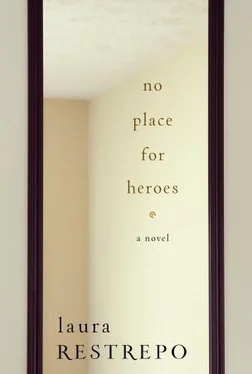“No. He was miserable. We had left Argentina at my request, distancing ourselves from the party. You were going to be two, we had gone through three tyrants, one after the other and each with his blood spilling — the generals Videla, Viola, and Galtieri. I couldn’t take it anymore. The anguish over the fact that something might happen to us before four in the afternoon, and that no one could pick you up from the sitter, was killing me. That was the worst part of the fear, that it would be four o’clock and no one would be there to pick you up at the sitter.
“For your safety and for my peace of mind, Ramón agreed to move to Bogotá and distance himself from everything that was his, the party, his comrades, what he liked to eat, and the only job he knew how to do. And in Bogotá, I forgot about him and left him very alone and isolated. For some reason, I remember with an almost photographic memory each of the objects that we had in Coronda and not even one of the objects we put up in the apartment in Bogotá; except for the poster in your room, I don’t remember any of them.”
One of the lines in that letter from Ramón that she did not read, the one that he left for her during the dark episode, said “exiled from everything, even your love.” And, “I’m taking the boy, the only thing that is mine.”
“Then you did read the letter.”
“No, only those lines.”
“I need a screwcork to pull information out of you.”
“Corkscrew.”
“Yeah, that. You know, there are times I would like to forgive him.”
“Wanting to forgive is already a form of forgiving, I suppose.”
“But no, no, he was a bullshitter, I wasn’t the only thing that he took with him. He also took that money that wasn’t his.”

AURELIA HAD BEEN in Coronda for only a brief while when Forcás announced that the leadership of the party wanted to meet with her. Aside from Forcás himself, Águeda and Ana would be there, two of the party’s historic directors. They were known to be powerful and mysterious, and spent most of the time outside of the country, from where they pulled strings, and their methods were known to be relentless.
“It was very rare that they would attend a meeting,” Lorenza told her son. “To meet Águeda and Ana was quite an opportunity. Ninety percent of the party membership had likely never seen them in person, only in photographs.”
“So it was like meeting Brad Pitt and Johnny Depp at the same time, huh?” Mateo asked.
“I couldn’t even begin to imagine what task I would be assigned or where they would want to send me. On the day of the meeting, Forcás accompanied me to the place, but didn’t divulge anything. Apparently he already knew how I was needed, but he didn’t want to tell me anything. I kept my eyes lowered, looking at the ground so as not to figure out the exact whereabouts of the meeting, although this precaution was superfluous, since there was no way I could figure it out.”
When she could look up again, she was inside a darkened house where someone had smoked a lot, the smell of cigarettes was the first thing she noticed. But it also smelled like garlic, so they must have been cooking. Forcás led her into the kitchen, which was unlike the other rooms, bathed in daylight coming in from a window that faced an inner courtyard, and the comrade who was cooking there said, “It’s gnocchi with ham broth, che , I hope you like it.”
Seated at a table, in front of an ashtray filled with butts, were the two women. The one who introduced herself as Águeda was older and wore her hair so short that her ears were completely visible, two gypsy-like monstrosities hanging from them. Ana, the quieter one, her lips painted red, had a face like an otter, but was good-looking nevertheless. Both rose to welcome her with a hug and immediately began to ask her questions about the political situation in Colombia and about the functioning of the solidarity with the Argentinean office in Madrid.
“And then I thought, That’s what they want,” Lorenza recounted to her son. “They want information on the international work, and it even occurred to me that they had wanted to meet with me to ask me to relocate, to return to Madrid. But no, it wasn’t that.”
“Listen, piba,” Águeda had told her, and Aurelia had listened, and on hearing what they wanted had gone cold. Her mouth grew dry and she couldn’t respond.
“I know what they wanted, you told me once,” Mateo said. “They wanted you to turn over San Jacinto to the party.”
“It’s called cotizar , to give up for the general welfare.”
“Yeah, cotizar , for you to give up San Jacinto for the general welfare.”
“They had found out that I inherited a finca in Colombia and they had come into the country to talk to me about how in the party we all lived with what we needed and gave up the rest for the general welfare, the good of the party. They said that this was the Bolshevik and proletarian thing to do, ‘the bolche and the prole,’ and that Homero had offered his mother’s apartment when she had passed away, and that La Gata had turned in the whole of her inheritance, and that Rafael, who was the owner of a factory, had given it to the party and now lived on a laborer’s salary.”
The bolche and prole, prole and bolche , and Aurelia before them mute. She hadn’t said yes, or no, not even maybe; she couldn’t say a thing. San Jacinto was the only thing she had left of her father. More than a finca, for her it was a collection of Sunday mornings, afternoons of hot chocolate and fritters, trips to the countryside, and whole nights by the fireplace. San Jacinto was a handful of animals with proper names and soft hair. How do you give up animals and memories for the national welfare?
“But most important, it was a finca, damn it,” Lorenza told the boy, “good land that was worth a few million pesos, in the end my only inheritance. And I couldn’t say a word. My ears were buzzing and their voices grew distant. I turned around to look at Forcás, as if begging him for help. Up to that moment, Forcás had remained silent, and when he opened his mouth it was to agree with them, the Bolshevik and the proletariat on one side and on the other the fucking petite bourgeoisie.”
She knew she didn’t want to, but she couldn’t avoid it, she had to say yes, of course she would give up the finca for the general welfare, but the words got caught in her throat. The worst thing in the world was to be a petit bourgeois, and she wanted with all her heart to be bolche and prole , but she heard those voices as if they were an echo, that So-and-so turned in his car, Such-and-such her marriage ring, and she was unable to hear anything but her own inner turmoil, as if she were chomping on raw carrots. Where could she find the words to explain to them that Papaíto baked bread in the oven, that San Jacinto was where his pampered cows grazed, that she had never received the dress he sent to Madrid? How could she tell them that her mother had sent her Bally shoes, that she had used the box to hide some dollars, and that Forcás had never given them back, although she reminded him of it every day? These were the only arguments that came to her head in defense of San Jacinto, and something told her that they weren’t going to sound very convincing to the ears of the two monuments carved from living rock who were sitting there, inheritors of the purest and hardest worker’s code, Águeda and Ana.
“So what did you say?” Mateo asked.
“That first I would have to go to Colombia to take over the inheritance, because it had not yet been transferred to me and I couldn’t do it from Argentina.”
Читать дальше













